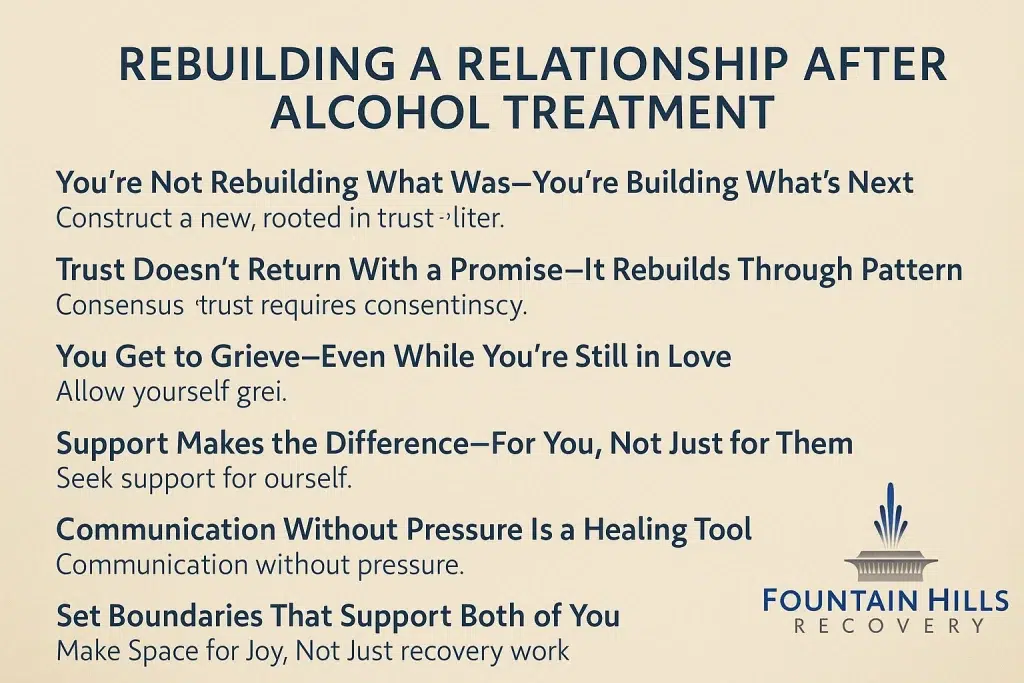When the person you love enters an alcohol treatment program, it marks a turning point. But what no one prepares you for is the chapter that comes next.
You’re not just trying to hold onto your relationship. You’re learning how to re-enter it after months—or years—of fear, damage, and emotional distance. You’re not starting over. You’re starting differently.
And that takes more than love. It takes patience, new tools, and help you don’t have to figure out alone.
You’re Not Rebuilding What Was—You’re Building What’s Next
It’s natural to want things to “go back to normal.” But if you’re honest, normal probably wasn’t working. Maybe it was marked by secrets, walking on eggshells, or chronic disappointment. So going back? That’s not the goal.
What you’re doing now is more honest—and harder: building something new, rooted in trust, mutual healing, and slower, steadier love.
Let go of the idea that things will snap back into place. This version of your relationship might be quieter, more vulnerable. But it can also be stronger than anything you’ve built before.
Trust Doesn’t Return With a Promise—It Rebuilds Through Pattern
Even if your partner completed treatment, trust doesn’t automatically reset. And that doesn’t make you cold or unforgiving. It makes you human.
Rebuilding trust requires consistency. Not just once, but over time. What rebuilds it:
- Telling the truth the first time
- Keeping small promises
- Being open about hard emotions
- Respecting the space you both need
You don’t have to rush your forgiveness or pretend you’re fine. Give trust time to earn its place again.

You Get to Grieve—Even While You’re Still in Love
Here’s what people forget: when someone enters treatment, it’s not just their recovery. It’s your reckoning, too. Maybe you lost pieces of yourself while trying to hold things together. Maybe you stopped saying what you needed just to avoid another fight. That grief matters.
Recovery can bring relief—and sadness. That’s okay. You’re allowed to love someone and still feel the weight of what addiction took from both of you.
Your pain doesn’t invalidate their progress. It simply means you’re healing too.
Support Makes the Difference—For You, Not Just for Them
One of the most common mistakes couples make after treatment is assuming the person who struggled is the only one who needs help. But relationships are systems. And addiction touches every part of that system.
If you’re looking alcohol treatment services in Scottsdale, make sure you find a provider that also offers resources for partners. A good alcohol treatment program will invite you into the process—not as a referee, but as a person who also deserves healing.
At Fountain Hills Recovery, we offer family engagement because we know relationships don’t heal in isolation.
Communication Without Pressure Is a Healing Tool
After treatment, it’s tempting to monitor everything: where they’re going, who they’re with, what they’re feeling. But healing can’t happen under a microscope. What your relationship needs isn’t surveillance—it’s space for honest, low-pressure communication.
Try asking:
- “How are you really feeling today?”
- “What’s one thing that helps you feel grounded right now?”
- “Is there anything you wish I understood better?”
Give each other permission to speak without fixing, perform without proving, and feel without judgment. That’s where closeness lives.
Set Boundaries That Support Both of You
Boundaries aren’t a punishment. They’re how you say, “I love you, and I also need safety.” They help prevent resentment, reduce guesswork, and create structure in unpredictable territory.
Examples of boundaries that support recovery and connection:
- No alcohol in the house—for now or permanently
- Attending individual therapy to unpack your own healing
- Agreeing on honest check-ins about triggers or cravings
- Knowing when to say, “I need a break from this conversation”
The most successful couples don’t avoid boundaries—they honor them together.
Make Space for Joy, Not Just Recovery Work
Early recovery can feel serious, and rightly so. But don’t forget to make room for joy. You’re still two people who fell in love—yes, amid pain, but also for real reasons. Hold onto those.
That might mean:
- Cooking dinner together without screens
- Finding a hobby neither of you did during the drinking years
- Revisiting old favorite music or movies—sober, this time
- Laughing without guilt
Healing isn’t just about avoiding what hurts. It’s about remembering what lifts you.
FAQs: Rebuilding a Relationship After Addiction Treatment
Can I still feel angry even if they’re sober now?
Yes—and you probably will. Sobriety doesn’t erase the past. It creates space to process it. That might mean confronting old pain. Therapy and support groups can help you channel that anger without letting it poison your progress.
What if I don’t feel close to them anymore?
Emotional intimacy often fades during periods of active addiction. Sobriety gives you the chance to rebuild it—but it may take time. Start with small, honest conversations. Share fears and wins. Ask questions. Connection is built, not stumbled into.
Should we do couples therapy?
Absolutely—if both of you are open to it. Couples therapy with someone trained in addiction recovery can be a game-changer. It gives structure, tools, and safety as you both navigate difficult conversations and rebuild trust.
What if relapse happens?
Relapse isn’t the end. It’s a warning sign. If your partner relapses, you’re allowed to feel disappointed—but try not to treat it as failure. It’s a call for more support, stronger boundaries, and clearer next steps. A good treatment center will help you plan for this possibility ahead of time.
How do I know if the relationship is still right for me?
That’s one of the hardest questions—and only you can answer it. But here’s what helps: ask yourself not just “Do I love them?” but also “Do I feel emotionally safe, respected, and seen here?” Love matters—but safety, peace, and shared effort matter more.
You’re Not the Only One Fighting for Something Real
Loving someone in recovery is courageous. So is asking, What about me?
You don’t have to choose between your love and your sanity. Rebuilding a relationship after treatment isn’t about perfect answers. It’s about shared commitment, mutual respect, and willingness to grow—even when it’s messy.
At Fountain Hills Recovery, we understand that real healing includes the people who stood beside the storm. Our alcohol treatment program is designed to support not just recovery, but reconnection—with self, with love, with each other.
Call (800) 715-2004 to learn more about our alcohol treatment program services in Fountain Hills, AZ. You’re not rebuilding alone—and you don’t have to.





